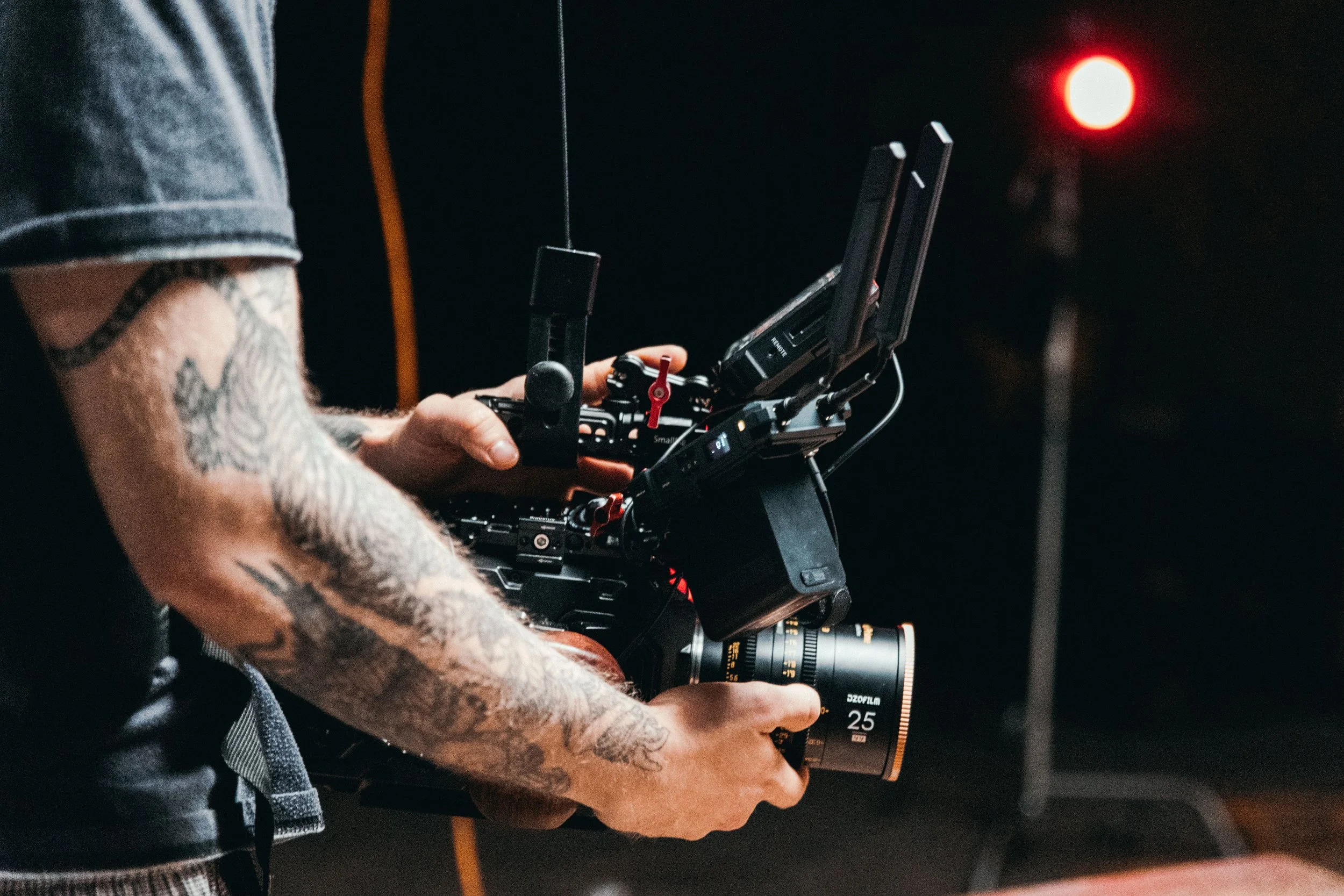Blog
4 Useful Tax Tips for Videographers
When you are in business as a videographer, whether as an employee or self-employed, you're probably spearheading video ad projects, producing some wedding or travel videography, and offering other video production services on the trot. Amid these bustles, however, there are some crucial duties that you should not overlook—filing and paying your taxes.
Even if you are employing someone else to handle your taxes, it is integral to understand tax processes to ensure that you are optimizing your business. Daunting as they may seem, but once you get a good grasp of these technicalities, tax filing and payment won't be a nuisance. After all, you do not want to see Internal Revenue Service (IRS) special agents showing up at your door. Not at all.
Income tax 101: For employees and self-employed
You can be classified as an employee or self-employed when it comes to paying taxes. Of course, this depends on your employment status. Employees' income is reported on a W-2 form from the IRS while self-employed individuals report their income on Form 1099-MISC. Take note that you do not necessarily need to have a business to report your income on the latter form. You may simply perform services as a non-employee.
Meanwhile, employees' expenses are listed on Form 2106 while self-employed people list their expenses on Schedule C (Form 1040). Should payment for services you provide be listed in Form 1099-MISC's box 7, Miscellaneous Income, the payer is treating you as a self-employed worker, which is referred to as an independent contractor.
Ensuring a smoother tax journey
Make sure to proactively prepare for the technical stuff so you won't have to deal with the painfully complex process of retracing all your financial activities (plus finding lost or strewed documents) when the tax season approaches. Consider these useful tips and witness a smoother tax journey for yourself or your business.
1. Keep impeccable records
Your expenses will be needed to calculate how profitable your business is and determine how much tax you will need to pay. And yes, it is your responsibility to track your income and tax liability throughout the year. Things can get puzzling especially if you lose sight of your records. Thus, it is critical to document every purchase receipt and invoice you have as well as other production costs you incur—both above and below the line—rigorously. You may also want to keep an electronic copy of your printed documents, whether scanned into PDF or captured using a device.
To ease the hassle of bookkeeping, you can start an expense diary, a tax planning tool, or utilize a user-friendly accounting software to aid you in recording and tracking your transactions.
2. Know your tax deductions
Tax deductions cut your taxable income, which is the amount of money the government can claim taxes on. Per the IRS, deductible business expenses are those incurred in connection with one's trade, business, or profession; "ordinary'' and "necessary"; and not lavish or extravagant under certain circumstances. Some common deductibles include computer-related software or items, film and video production equipment, subscriptions, travel and meal expenses, office supplies, reference materials, online expenses (including cloud storage, membership fees, and website costs), promotion costs, among others. Make sure you can justify your tax deductions too.
Amount-wise, some tax deductions may seem insignificant. However, adding many of them together may result in hefty savings, especially when complemented with tax credits.
3. Hire a seasoned tax advisor or CPA
If you are self-employed or a freelancer who needs help in navigating the nitty-gritty of what can be deducted and not, you may find it useful to hire a seasoned tax advisor or CPA with existing clients in the same industry as yours. Your CPA and/or advisor can help you with bookkeeping, tax planning, cash flow analysis, and other financial matters. This allows you to allay some of your responsibilities and focus more on your craft.
With their knowledge and expertise, you can enjoy smoother financial management and have more savings. Your tax advisor or CPA can guide you better in making the best financial decisions and support you when you are audited by the IRS.
4. Set payment reminders
As a videographer, you may often be tied up with a couple of projects and remain busy. Make sure to stay on top of your taxes by setting payment reminders on your calendar. This can help you identify your next tax-related undertaking and know when to complete your tax filing and payment. As a result, you can save more time.
Final thoughts
Keeping your finances organized is a demanding task that requires more time and effort. Therefore, you have to consider these tips and start planning for next year's income tax returns so you can work on your creative pursuits peacefully.
Written by Sophia Young
Becoming a Morning Person: Secrets of Early Risers
September 2, 2021
Getting up early in the morning can be challenging, especially when you’re tempted to hit the snooze button several times. Some people are actually early risers and consider themselves to be a morning person. What’s the secret to these early birds, and what are the benefits of becoming like one? There are actually several health benefits of waking up early. Most importantly, you’ll have time to prepare a healthy breakfast, do some morning exercise, and spend some time relaxing before you start your busy day. Many people claim that getting up early gives them more energy throughout the day too. Early risers tend to be more productive and have a positive outlook. Read on to learn how to become a morning person so that you can experience some of these benefits for yourself.
Planning a morning routine: start with a sleep schedule
One of the secrets of early risers is that they know how to develop and follow a consistent sleep schedule and a healthy morning routine. This routine will set the tone for your day and help you feel more prepared for whatever comes your way. There is a lot involved in developing a good morning routine. Remember, becoming a morning person won’t happen overnight. You’ll need to create new habits that will change your daily schedule and your nightly sleep schedule so you can start rising early. None of these plans will work if you don’t have a good, consistent sleep schedule, so this should be your first step before mapping out your new daily morning routine.
Keep a steady sleep schedule: If you want to be an early riser, you’ll need to start and keep a steady, consistent sleep schedule. Go to bed at the same time every night and wake up at the same time each day. This includes the weekends, which means that you shouldn’t sleep in on your days off. By sticking to the same schedule, you’ll set your body’s circadian rhythm, which will make it easier to rise early over time. Consistently doing this is the best way to develop a good morning routine that will become a part of your everyday life.
Tips on getting a good night’s sleep: Sleeping soundly will make it much easier to wake up early in the morning and develop the best morning routine. To sleep better, keep the room temperature as low as possible and avoid looking at your devices (smartphone or tablet) at least 30 minutes to an hour before you head to bed. Create a peaceful, restful environment that will help you feel relaxed and calm. Use white or ambient noise if that enables you to fall asleep using a fan or noise machine. Ambient music also works well. Ideally, it’s best to avoid eating and drinking close to your bedtime. However, if you’re extremely hungry, the best late-night snacks and drinks are healthy and light. Munch on some cold vegetables and hummus, try a bit of oatmeal, or simply drink a glass of water to help you feel full so you can sleep soundly.
Morning routines of successful people
Becoming a morning person takes time, but the proper routine will set you up for success. Not everyone will do the exact same things with their mornings, but there are a few important things that you should try to incorporate into your daily schedule.
Take your shower in the morning: Showering when you wake up not only helps you feel more alert but also ensures that you’re clean and fresh for the day. Try to take your shower in the morning so that you’re starting things off on the right foot. This is important whether you go into an office or work from home. Showering in the morning may also help reduce feelings of anxiety and fatigue to help you feel alert throughout the day.
Drink water and stay hydrated: When you wake up, a glass of water is a great way to start your day. Try to drink as much water as possible to help you stay hydrated. When you’re dehydrated, it can cause brain fog, fatigue, and headaches. Drinking a lot of water is the best way to give your body the hydration it needs to stay healthy and alert.
Don’t check your email or phone: When you wake up, it’s tempting to check the latest headlines or read new emails. Doing this as soon as you wake up can make you feel anxious and cause you to feel rushed and stressed. Try to avoid looking at your phone first thing, and instead, focus on your health and well-being by going directly into the shower or do some meditating. There will be plenty of time to read emails and headlines later in the day.
Morning skincare routine
A good morning skincare routine will help you look and feel your best. Here are some tips and steps to help you get your skin primed and ready for the day:
If you don’t have time to shower in the morning, it’s important to cleanse your face at least.
Start your skincare routine by using a quality facial cleanser to remove dirt and oil buildup.
Once your face is clean, follow up with a toner to remove any leftover makeup, oil, or dirt that the cleanser may have missed.
Use a serum or moisturizer to target problem areas on your skin. This will make your skin feel dewy and fresh, and a quality moisturizer will help prevent feelings of dryness or irritation during the day.
Always apply sunscreen to your face before you head out the door. Sunscreen protects you from dangerous UV rays that can cause premature aging, sunburn, and skin cancer.
If you wear makeup, apply it after cleansing, toning, moisturizing, and applying sunscreen to your face and neck. A primer will help you create a lovely canvas that allows your foundation and eye makeup to last longer.
Importance of eating breakfast
One of the benefits of early rising is that you’ll have time to prepare and enjoy a nutritious, well-balanced breakfast. Studies have shown that eating breakfast helps you stay alert, focused, and energetic during the day. Here are some other benefits of eating breakfast as part of a good morning routine:
Eating a nutritious breakfast can help jumpstart your metabolism, which may contribute to weight loss or maintaining a healthy weight.
Children who eat breakfast do better in school because they need the fuel to stay alert and focused. The same idea applies to adults too.
When you eat a well-balanced breakfast, you won’t feel as hungry during the day. This will help you avoid eating unhealthy snacks and can keep you going strong until lunchtime.
Morning workout
Developing a morning workout routine is excellent for your body and mind. Here are a few tips to help you get started.
Start a morning stretch routine: Getting your morning stretch in every day will help you feel more focused and alert. Stretching promotes healthy circulation and will also help protect your body from things like neck or back pain. Practice a few simple daily stretches every morning to get your day started on the right foot.
Benefits: There are many incredible benefits to developing a good morning exercise routine. Daily exercising can improve your mood, help you lose weight, strengthen your muscles, and even help you sleep better at night. Start your day with some simple exercises to get yourself motivated, energized, and in a good mood.
Fitness examples: You don’t have to be athletic to practice some healthy fitness routines every morning. A brisk 20-minute walk is a great way to get in some daily exercise. You can also lift some hand weights for a few minutes each morning or try a quick cardio session.
Morning yoga routine: Practicing yoga or meditation in the morning can set you up for a great day ahead. Learn how to do simple yoga poses, then slowly work your way toward more complex poses as you go. When you do a little bit of yoga in the morning, you’re improving your physical and mental health at the same time.
Morning meditation and journaling
Some simple morning meditation and journaling can do wonders for your stress and anxiety. Here are some morning routine ideas to help improve your mental health and reduce your stress levels.
Wellness: Practicing daily morning meditation can help you feel balanced and calm. Meditation is an integral part of overall wellness and can help you feel more positive and energized. Start with a short morning meditation every day to set your mind on the right path.
Bullet journaling: Keeping a bullet journal is a great way to help you feel more in control of your day and your schedule. This journaling method involves keeping your to-do lists, schedule, and other important information together in one single journal or notebook. Doing this in the morning will give you a sense that you’re in control of the day ahead and make it easier for you to get things done.
Reading a book or the paper: Start your morning by enjoying some quiet time as you dive into a good book or read the daily newspaper. Quietly reading can set the tone for your day and gives you a chance to relax before things start to get hectic.
Even if you are not a morning person, use these tips to help you become an early riser. With the proper morning routine and healthy breakfast, you can start your day on the right foot. Remember to develop a consistent sleep schedule, get in some morning exercise, and practice self-care to help you become a successful early bird.


















































































































































































































































































































































































